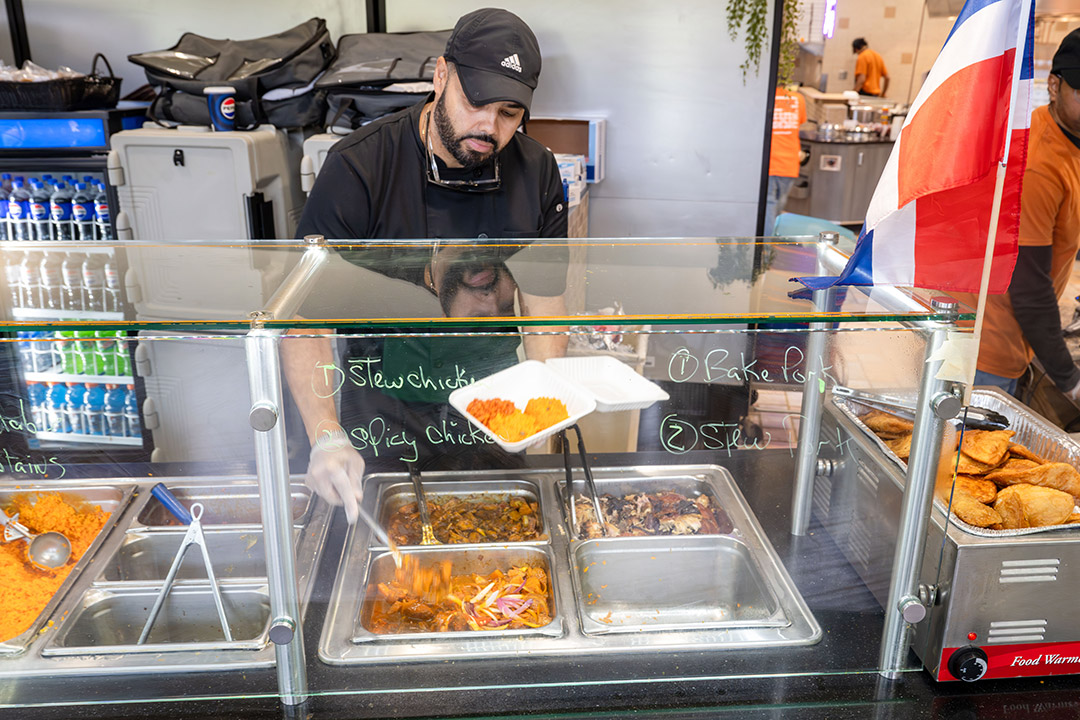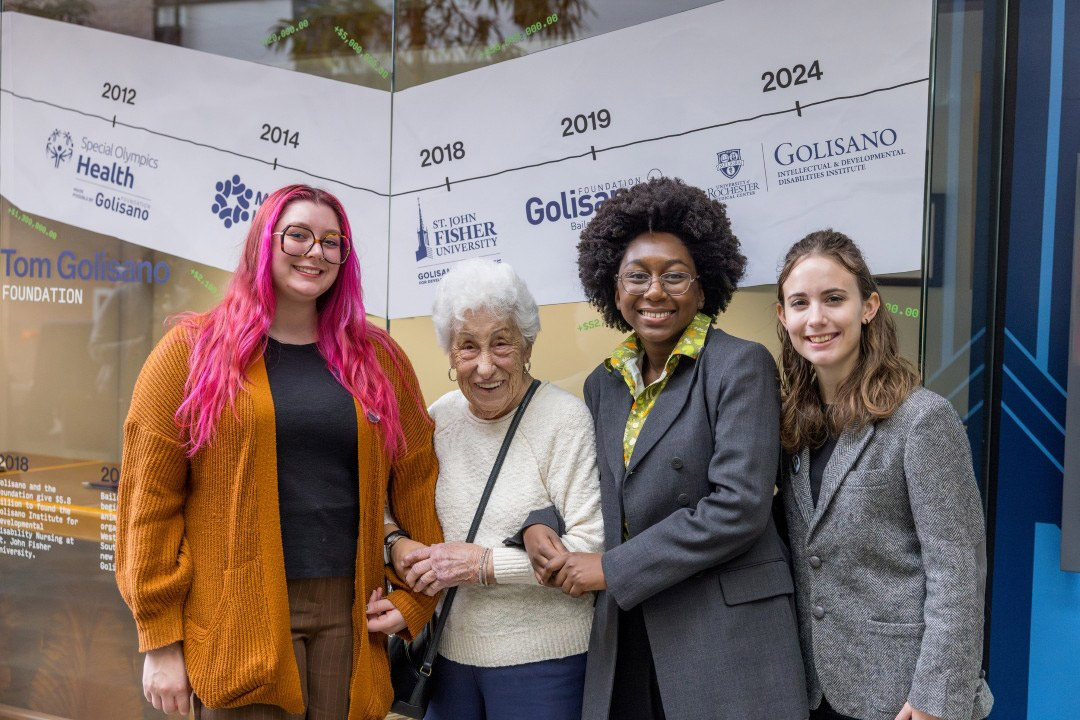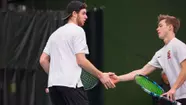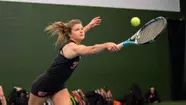Visiting chefs and family recipes offer international flavor to RIT meal options
While pizza, burgers, salads, and subs remain popular choices for hungry college students, there are more options than ever before at RIT dining halls thanks to ethnic dishes brought by visiting chefs and family recipes from staff. “The visiting chef program continues to bring exciting new flavors to campus,” said Herlan Manurung, corporate executive chef and associate director for RIT Dining. “Each visiting chef contributes something new, building on the diverse options our community has access to.” The visiting chefs, nine this semester, rotate among the Ritz, Kitchen at Brick City, and the Café and Market at Crossroads for lunch and dinners during weekdays when classes are in session. “This program also helps our staff learn new culinary techniques and recipes that these restaurants offer,” Manurung said. “Our community comes from different parts of the United States as well as many international countries. By offering a variety of food as well as foods from different cultures, we are hoping to make them feel at home.” Ike Ansari and his cousin Yasin Rao were the first visiting chefs at RIT in 2004, when they brought food from their nearby restaurant, Pakistani House, to campus. The reaction was so good that they eventually closed their restaurant and began P.H. Express to focus on providing more than 1,400 lunches and dinners a week to RIT. Using recipes from his mother and wife, Ansari serves four Halal dishes from Pakistan and India, including his most popular, tandoori chicken with barbecue curry sauce, and vegetable biryani. Each day, he’ll cook up 60 pounds of rice and 120 pounds of chicken, place it in hot boxes and transport it in their van to campus. It’s not uncommon to find 15 to 20 people in line waiting for them to open. “Our food taste is not typical of a restaurant,” Ansari said.
Peter Schuck/RIT Sous Chef Kenny McNair provided recipes from his late grandmother’s Puerto Rican dishes for the International Bar at Gracie’s. Employee family recipes are just one way RIT is offering diverse menu items.
While Ansari has heard many international students say the food reminds them of home, 90 percent of his customers are not of Pakistani or Indian heritage, he said. Luis Tejeda, who owns D’Mangu restaurant in Rochester, has provided Dominican lunches and dinners five times a week on campus for about 12 years. “Everything’s authentic and seasoned specially,” he said, as he and his cousin, William Del Rio, served hungry students at Crossroads. He posts two small flags from the Dominican Republic, his native country, on the counter when he’s serving. “Where else are you on campus?” asked one student. “Your food is the best. Your pulled pork is terrific.” Chefs specializing in dishes from Nigeria, Korea, and Peru, as well as chefs specializing in sushi and macaroni and cheese (gluten-free or with barbecued chicken and bacon if desired) also partner with RIT, and more may be considered. The diverse menu options don’t always come from off campus. Some recipes are from current employees. Kenny McNair, a sous chef at Gracie’s, stepped up to provide recipes of dishes his late grandmother, who was born in Puerto Rico, used to make. Now her pink beans and rice, plantains, salsa verde pork, tuca en escabeche, and pollo guisado chicken are featured at Gracie’s Latin Bar, which rotates each semester at its international station, along with Indian, Southern, and Caribbean offerings. One student who ordered the beans and rice said she enjoys trying all of the different options as opposed to eating the same thing every day. “It makes me feel good. I’m glad people are enjoying it. It’s all about the enjoyment of eating,” McNair said.
 Visiting chefs and family recipes offer international flavor to RIT meal optionsWhile pizza, burgers, salads, and subs remain popular choices for hungry college students, there are more options than ever before at RIT dining halls thanks to ethnic dishes brought by visiting chefs and family recipes from staff. “The visiting chef program continues to bring exciting new flavors to campus,” said Herlan Manurung, corporate executive chef and associate director for RIT Dining. “Each visiting chef contributes something new, building on the diverse options our community has access to.” The visiting chefs, nine this semester, rotate among the Ritz, Kitchen at Brick City, and the Café and Market at Crossroads for lunch and dinners during weekdays when classes are in session. “This program also helps our staff learn new culinary techniques and recipes that these restaurants offer,” Manurung said. “Our community comes from different parts of the United States as well as many international countries. By offering a variety of food as well as foods from different cultures, we are hoping to make them feel at home.” Ike Ansari and his cousin Yasin Rao were the first visiting chefs at RIT in 2004, when they brought food from their nearby restaurant, Pakistani House, to campus. The reaction was so good that they eventually closed their restaurant and began P.H. Express to focus on providing more than 1,400 lunches and dinners a week to RIT. Using recipes from his mother and wife, Ansari serves four Halal dishes from Pakistan and India, including his most popular, tandoori chicken with barbecue curry sauce, and vegetable biryani. Each day, he’ll cook up 60 pounds of rice and 120 pounds of chicken, place it in hot boxes and transport it in their van to campus. It’s not uncommon to find 15 to 20 people in line waiting for them to open. “Our food taste is not typical of a restaurant,” Ansari said. Peter Schuck/RIT Sous Chef Kenny McNair provided recipes from his late grandmother’s Puerto Rican dishes for the International Bar at Gracie’s. Employee family recipes are just one way RIT is offering diverse menu items. While Ansari has heard many international students say the food reminds them of home, 90 percent of his customers are not of Pakistani or Indian heritage, he said. Luis Tejeda, who owns D’Mangu restaurant in Rochester, has provided Dominican lunches and dinners five times a week on campus for about 12 years. “Everything’s authentic and seasoned specially,” he said, as he and his cousin, William Del Rio, served hungry students at Crossroads. He posts two small flags from the Dominican Republic, his native country, on the counter when he’s serving. “Where else are you on campus?” asked one student. “Your food is the best. Your pulled pork is terrific.” Chefs specializing in dishes from Nigeria, Korea, and Peru, as well as chefs specializing in sushi and macaroni and cheese (gluten-free or with barbecued chicken and bacon if desired) also partner with RIT, and more may be considered. The diverse menu options don’t always come from off campus. Some recipes are from current employees. Kenny McNair, a sous chef at Gracie’s, stepped up to provide recipes of dishes his late grandmother, who was born in Puerto Rico, used to make. Now her pink beans and rice, plantains, salsa verde pork, tuca en escabeche, and pollo guisado chicken are featured at Gracie’s Latin Bar, which rotates each semester at its international station, along with Indian, Southern, and Caribbean offerings. One student who ordered the beans and rice said she enjoys trying all of the different options as opposed to eating the same thing every day. “It makes me feel good. I’m glad people are enjoying it. It’s all about the enjoyment of eating,” McNair said.
Visiting chefs and family recipes offer international flavor to RIT meal optionsWhile pizza, burgers, salads, and subs remain popular choices for hungry college students, there are more options than ever before at RIT dining halls thanks to ethnic dishes brought by visiting chefs and family recipes from staff. “The visiting chef program continues to bring exciting new flavors to campus,” said Herlan Manurung, corporate executive chef and associate director for RIT Dining. “Each visiting chef contributes something new, building on the diverse options our community has access to.” The visiting chefs, nine this semester, rotate among the Ritz, Kitchen at Brick City, and the Café and Market at Crossroads for lunch and dinners during weekdays when classes are in session. “This program also helps our staff learn new culinary techniques and recipes that these restaurants offer,” Manurung said. “Our community comes from different parts of the United States as well as many international countries. By offering a variety of food as well as foods from different cultures, we are hoping to make them feel at home.” Ike Ansari and his cousin Yasin Rao were the first visiting chefs at RIT in 2004, when they brought food from their nearby restaurant, Pakistani House, to campus. The reaction was so good that they eventually closed their restaurant and began P.H. Express to focus on providing more than 1,400 lunches and dinners a week to RIT. Using recipes from his mother and wife, Ansari serves four Halal dishes from Pakistan and India, including his most popular, tandoori chicken with barbecue curry sauce, and vegetable biryani. Each day, he’ll cook up 60 pounds of rice and 120 pounds of chicken, place it in hot boxes and transport it in their van to campus. It’s not uncommon to find 15 to 20 people in line waiting for them to open. “Our food taste is not typical of a restaurant,” Ansari said. Peter Schuck/RIT Sous Chef Kenny McNair provided recipes from his late grandmother’s Puerto Rican dishes for the International Bar at Gracie’s. Employee family recipes are just one way RIT is offering diverse menu items. While Ansari has heard many international students say the food reminds them of home, 90 percent of his customers are not of Pakistani or Indian heritage, he said. Luis Tejeda, who owns D’Mangu restaurant in Rochester, has provided Dominican lunches and dinners five times a week on campus for about 12 years. “Everything’s authentic and seasoned specially,” he said, as he and his cousin, William Del Rio, served hungry students at Crossroads. He posts two small flags from the Dominican Republic, his native country, on the counter when he’s serving. “Where else are you on campus?” asked one student. “Your food is the best. Your pulled pork is terrific.” Chefs specializing in dishes from Nigeria, Korea, and Peru, as well as chefs specializing in sushi and macaroni and cheese (gluten-free or with barbecued chicken and bacon if desired) also partner with RIT, and more may be considered. The diverse menu options don’t always come from off campus. Some recipes are from current employees. Kenny McNair, a sous chef at Gracie’s, stepped up to provide recipes of dishes his late grandmother, who was born in Puerto Rico, used to make. Now her pink beans and rice, plantains, salsa verde pork, tuca en escabeche, and pollo guisado chicken are featured at Gracie’s Latin Bar, which rotates each semester at its international station, along with Indian, Southern, and Caribbean offerings. One student who ordered the beans and rice said she enjoys trying all of the different options as opposed to eating the same thing every day. “It makes me feel good. I’m glad people are enjoying it. It’s all about the enjoyment of eating,” McNair said. New exhibit celebrates Golisano’s philanthropyRIT is celebrating entrepreneur and philanthropist B. Thomas Golisano’s legacy with a student-curated exhibit in the Golisano College of Computing and Information Sciences atrium. Members of the Golisano Foundation and Golisano’s sister, Marie Golisano Graham, visited RIT on Oct. 22 for the exhibit opening. The installation, “A Good Deal for Everyone,” focuses on the response to Golisano’s philanthropic contributions through his Golisano Foundation, which was established 40 years ago. “It’s a beautiful exhibit that really fits in with the spirit of giving,” said Golisano Graham. Traci Westcott/RIT Landyn Hatch, from the RIT Archives, spoke about ways that the archives provide impactful source material for students to shape exhibits and share stories. The title of the exhibit is based on a quote from Golisano, “Be brave, be fair, act with integrity and above all, always strive to create a good deal for everyone.” The display includes a historical timeline of Golisano’s giving and recreated thank you cards from people touched by the Golisano Foundation. “When I think about the tangibility of Tom and Marie’s legacy, I always come back to the thank you cards,” said Landyn Hatch, innovation and engagement archivist in the RIT Archives. “Everyone can look at the cards hanging in this case and find something that relates to them.” In 2024, Golisano gave $500 million to various community organizations, including a $10 million gift to RIT. Public gratitude for his generosity is showcased by the hundreds of thank you cards still being archived in the RIT Archives’ B. Thomas Golisano Collection today. Student curators Nicole Feldman and Sophie Abatiell Tommola, both museum studies majors, developed the exhibit concept. Fourth-year graphic design major Ashley Persia created the installations in the Command+g Design Lab, a woman’s design group in the College of Art and Design and a collaborative partner with the RIT Archives. Traci Westcott/RIT A new exhibit from the RIT Archives’ B. Thomas Golisano Collection showcases recreated thank you cards from those impacted by Golisano’s philanthropy. “The waves in front of the thank you cards represent the waves of gratitude that people have for Mr. Golisano’s support,” said Persia. “It was amazing seeing something that I worked on go from an idea on a small screen to becoming a huge exhibit for everyone to enjoy.” Amina Davila-Webster, a fourth-year graphic design major, worked on the historical timeline of Golisano’s giving. She said that the timeline begins at a drawing of a printing calculator—the same machine that Golisano used when creating Paychex that now sits on the desk in the exhibit. The team also produced a timeline for the Wallace Library that documents the numerous student-curated exhibits and projects that grew from the Golisano Collection donated in 2015 by Golisano Graham.
New exhibit celebrates Golisano’s philanthropyRIT is celebrating entrepreneur and philanthropist B. Thomas Golisano’s legacy with a student-curated exhibit in the Golisano College of Computing and Information Sciences atrium. Members of the Golisano Foundation and Golisano’s sister, Marie Golisano Graham, visited RIT on Oct. 22 for the exhibit opening. The installation, “A Good Deal for Everyone,” focuses on the response to Golisano’s philanthropic contributions through his Golisano Foundation, which was established 40 years ago. “It’s a beautiful exhibit that really fits in with the spirit of giving,” said Golisano Graham. Traci Westcott/RIT Landyn Hatch, from the RIT Archives, spoke about ways that the archives provide impactful source material for students to shape exhibits and share stories. The title of the exhibit is based on a quote from Golisano, “Be brave, be fair, act with integrity and above all, always strive to create a good deal for everyone.” The display includes a historical timeline of Golisano’s giving and recreated thank you cards from people touched by the Golisano Foundation. “When I think about the tangibility of Tom and Marie’s legacy, I always come back to the thank you cards,” said Landyn Hatch, innovation and engagement archivist in the RIT Archives. “Everyone can look at the cards hanging in this case and find something that relates to them.” In 2024, Golisano gave $500 million to various community organizations, including a $10 million gift to RIT. Public gratitude for his generosity is showcased by the hundreds of thank you cards still being archived in the RIT Archives’ B. Thomas Golisano Collection today. Student curators Nicole Feldman and Sophie Abatiell Tommola, both museum studies majors, developed the exhibit concept. Fourth-year graphic design major Ashley Persia created the installations in the Command+g Design Lab, a woman’s design group in the College of Art and Design and a collaborative partner with the RIT Archives. Traci Westcott/RIT A new exhibit from the RIT Archives’ B. Thomas Golisano Collection showcases recreated thank you cards from those impacted by Golisano’s philanthropy. “The waves in front of the thank you cards represent the waves of gratitude that people have for Mr. Golisano’s support,” said Persia. “It was amazing seeing something that I worked on go from an idea on a small screen to becoming a huge exhibit for everyone to enjoy.” Amina Davila-Webster, a fourth-year graphic design major, worked on the historical timeline of Golisano’s giving. She said that the timeline begins at a drawing of a printing calculator—the same machine that Golisano used when creating Paychex that now sits on the desk in the exhibit. The team also produced a timeline for the Wallace Library that documents the numerous student-curated exhibits and projects that grew from the Golisano Collection donated in 2015 by Golisano Graham. Men's tennis drops home match to conference rival UnionROCHESTER, NY - The RIT men's tennis team (3-4, 0-3 Liberty League) fell to Liberty League foe Union College (3-0, 2-0 Liberty League) from the Midtown Athletic Club Sunday afternoon. Union would win two of three doubles points. RIT's Brennan Bull and Jacob Meyerson earned RIT's lone doubles point in a great...
Men's tennis drops home match to conference rival UnionROCHESTER, NY - The RIT men's tennis team (3-4, 0-3 Liberty League) fell to Liberty League foe Union College (3-0, 2-0 Liberty League) from the Midtown Athletic Club Sunday afternoon. Union would win two of three doubles points. RIT's Brennan Bull and Jacob Meyerson earned RIT's lone doubles point in a great... Women's tennis suffers loss to Skidmore in Liberty League openerROCHESTER, NY - The RIT women's tennis team (4-2, 0-1 Liberty League) dropped its Liberty League Conference opener, 9-0 to defending champion Skidmore College (5-0, 4-0 Liberty League) from the Midtown Athletic Club Sunday afternoon. Skidmore would take the first three doubles points. At first doubles, Anne Taylor and Kristen Zablonski put...
Women's tennis suffers loss to Skidmore in Liberty League openerROCHESTER, NY - The RIT women's tennis team (4-2, 0-1 Liberty League) dropped its Liberty League Conference opener, 9-0 to defending champion Skidmore College (5-0, 4-0 Liberty League) from the Midtown Athletic Club Sunday afternoon. Skidmore would take the first three doubles points. At first doubles, Anne Taylor and Kristen Zablonski put...

